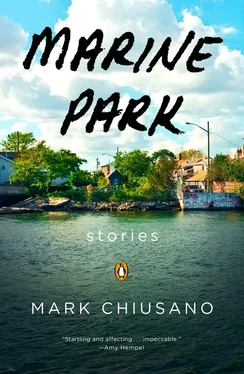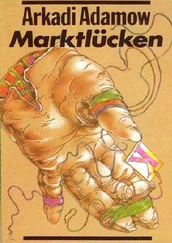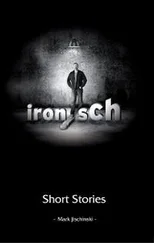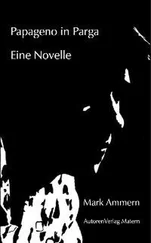• • •
Sometime that summer the Army Corps made a baseball field out of desert and nothing, once they were done with the scientific installations. Oppenheimer thought it was good to have us doing something other than work and drink. It was mostly popular with the military men, who played pepper and hit fungoes. But some of the scientists would go watch, and a few number theorists from California made a pretty good infield. Lise liked to sit behind home plate with a skirt on and her legs crossed.
She told me once when I was sitting in her office that she thought I could try to apply myself in ways outside of work, so the next day I went down to the dugout when they were choosing up teams. All anyone wore was T-shirts and jeans then out west, except for the soldiers, of course, who did everything in semi-uniform. One of the sergeants was from Sheepshead Bay and told the number theorists to take me for their outfield. They gave me a glove, and when I ran by, Lise raised her eyebrows and crossed her arms.
I only got one at-bat that day, because they rang an air-raid drill in the second inning. I walked on four pitches, and Lise clapped, and I was looking so much toward her that the PFC playing first base picked me off. I didn’t even go back to the dugout, just sat next to her on the bleachers, and she said to me, very sincerely, it could have been worse. I had been worried the whole time in right field about getting a fly ball. I’d never been much good back in Brooklyn. It was a high sky, and that sun was along the first-base line, and I imagined the ball and the sun in my field of vision obscuring each other. I felt sick imagining the ball making two-run-double contact with the ground.
Of course Lise was the love of the whole place. During the dances she told me, when we sat together afterward, that she tried to time each turn with a guy so each one got two and a half minutes. Everyone asked her for dinner, and walks, most of which she declined. She liked being with me, she said, because she knew I was here for the right reasons. What are those? I asked.
Do you miss home? she said. I told her.
What do you think will happen when it ends?
I didn’t have an answer.
I’m going to miss the sand of it. She had her shoes off and was drawing circles with her toes.
Look, I said, it’s us. I drew another circle to make a Venn diagram.
She put her hands around me then, and I only felt her smile.
She liked to listen to music while she worked, particularly piano, and I found her a record player in town. Sometimes I brought my drawings into her office too and watched her working, me tracing the air currents things leave when they fall at terminal velocity. There were more and more people running down the halls at that time, and sometimes they came and asked for our pieces of paper. Sometimes you heard people shout in the corridors, and nobody came out and checked if anyone was hurt anymore, because it would just be someone doing something important.
• • •
We had been there for a few months, Lise and I, when they got enough uranium to run a test. On the morning of Trinity, I was the last one on top of the tower. We were dropping it from fifteen stories up. One of the chemists had asked an explosives man standing near me at breakfast that morning, wouldn’t the tower look conspicuous to everyone after we did the drop? The guy just looked at him.
I was at the top fixing the packaging, making sure the angle was right so it wouldn’t hit the scaffolding on the way down. The Gadget had a three-foot radius, and in the tests I ran, it could have a horizontal variance of three inches before the blow. I’d told them to make the drop chute at least eight feet wide, and they gave it ten. It was the middle of a rainstorm, and the lightning was coming down all around me. You could see it hit the desert and the chain-link fences around our compound. Obviously it occurred to me that on top of a metal tower next to the Gadget wasn’t the safest place to be with lightning dropping, but someone had to do it. I had heard the theorist squad two days ago asking if everyone was sure this wasn’t going to blow holes in the atmosphere. Because then we’d really be cooked. I got off the tower and they drove us ten miles away to a bunker.
Two guys from Washington were there to observe, and they were standing a few people away from me. Oppenheimer told everyone to squat on their knees. Then he made us turn in the opposite direction of the tower. Ten seconds before it happened he told us to put our palms over our eyes. The Washington guys looked at each other and one said, What’d we come all this way for then? But they did it and then it dropped and we saw our white bones under the skin of our hands.
That night Lise and I climbed out her window onto the roof. One of the German émigrés was playing Tchaikovsky two buildings over. She wanted to dance, and we did, and it was good to be doing something, getting the motion out of our veins. The dust was still coming down at the edge of the horizon, and it was still colored green and purple and pink from the radiation. The thing just blew. I wanted to jump, or pound my fist on the rooftops, or cover Lise with my entire life up to now. Something happened. Something had changed. When Lise pulled off my belt, I almost ripped the top of her blouse. The chipped paint scratched up my back. Later, she asked, Was that your first time? And I lied.
We heard the news about the Gadget going overseas in the morning. There were loudspeakers set up around the compound on top of telephone poles. They played the national anthem and then a sober-voiced man said the tests had worked as well as our wildest dreams. There was champagne at the laboratory benches. Someone was pouring bourbon from imported bottles into beakers, and we toasted.
Lise was with the observation team that was going over to help the crew’s training for three weeks. We put a chair under the doorknob in her bathroom and her roommate just knocked and knocked. When she tried to get out, I threw her back against the shower again and again. Her eyes got wide and then wider. We ran to the landing strip, which they’d doubled in size over two weekends. They dressed the observational team in fatigues, and a lot of us, including Oppenheimer, went to wave the plane good-bye.
• • •
During that time we played a lot of pickup baseball on the compound. We were waiting for the OK to get started on the new project, working with hydrogen, 400,000 times more powerful. Everyone was banging on the chalkboards to get going, but Washington said wait. Oppenheimer was traveling back and forth from the East Coast.
The field was yellow with half straw at this heat in August, though the Army Corps people watered the diamond every other week. There was a layer of fine sand over the infield base paths, which made it easy to get grounders. You could just sit back and wait for them to die and swirl in the dust. I liked taking rounds and rounds with the number theorists and some privates, switching off who would hit and then getting in line, seeing who would let the ball through their legs first. It was a game my father would play with other handymen, in the one part of the park that had dry dirt. I had a letter from him, and the un-blacked-out part said, Double-decker boardwalk canceled, from — to — Island. No more restaurants on the top half — I didn’t read the rest. It didn’t feel right in letters. The bat was made of aspen wood from a tree on the compound, and some genius had carved on the power spot, Los Alamos, Home of Explosions . We spent long afternoons there, lying in the dusty outfield, looking at the sun. It was a pulsing, living thing that summer, its image burned into our retinas while we waited.
When Lise came back I went to meet the plane, and I asked her if she wanted to go to the cantina for a drink. The particle physicist from the office next to hers was holding a banner, and they were pumping music through the loudspeakers. I tried to press the khaki of her shirt against my chest. But she pushed me off and went to her room. When she came out she was in civilian clothes and she wanted to get dinner. In town we were stopped at a green light waiting for jeeps to go by, and she told me she wasn’t going to stay.
Читать дальше











